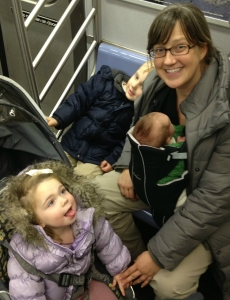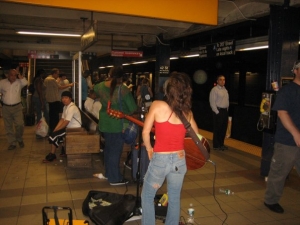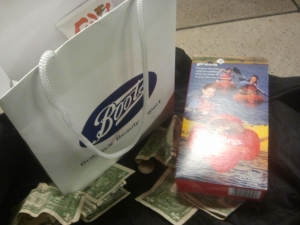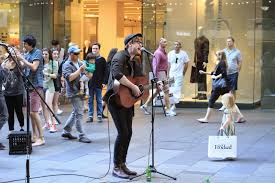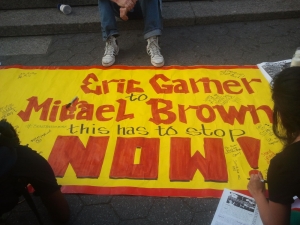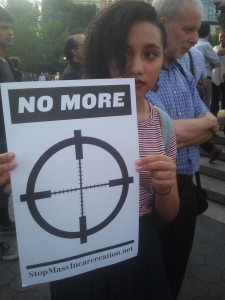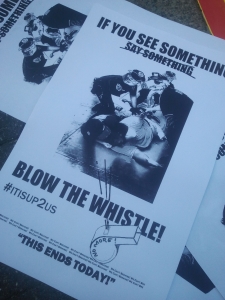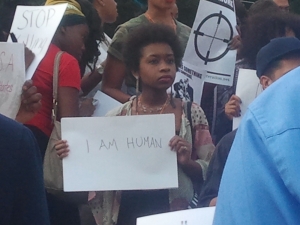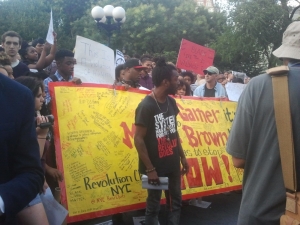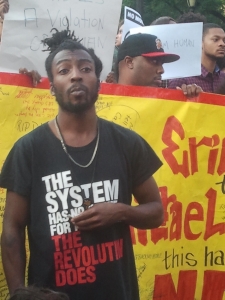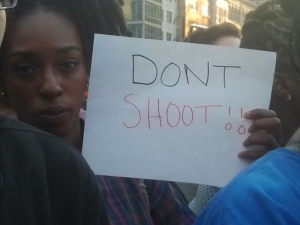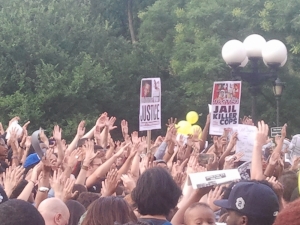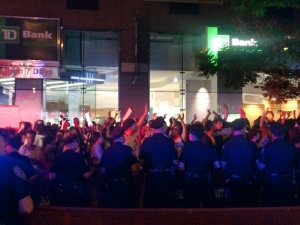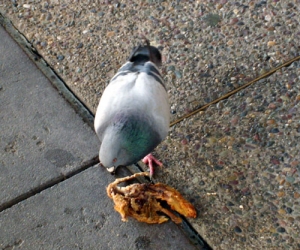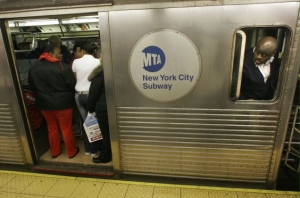Posts tagged: The Subway Diaries
A Goospimply Day
Most favourite underground comment; “Your singing gave me goosbumps” Today was a multiple goospimply day
Busking Gifts
People kept stopping by bearing random gifts today Underground. First it was a Box of Girl Scout Cookies, then some kinda fancy-schmanzy shampoo & conditioner (at least the lady who dropped it in my case said it was). By the end of my day I kinda felt like the baby Jesus & the three wise men #newyorkundergroundlove
“YES, BUSKING PERMITS IN THE USA ARE ILLEGAL”
YES, BUSKING PERMITS IN THE USA ARE ILLEGAL.
” busking licenses themselves are unconstitutional.In the USA, public performance is protected by the First Amendment“
http://gravitydefiance.net/wp/yes-busking-permits-in-the-usa-are-illegal/
I count myself as a veteran street performer, though by no means am I among the oldest-school of us. Having performed on the streets of fourteen cities in five different countries, I feel like I have a fairly dialed show. I have a good grasp of public space, social dynamics, crowd control, and comic timing, and on a good day I can pull a month’s rent in my hat.
It also means that I have been chased around by a lot of police and private security. Like most hecklers, they usually fall back on the same lines – “you can’t vend here, it’s a safety issue, this public street is private property” – but what they don’t know is that shutting down a street show in the USA is illegal. Not only that, but busking licenses themselves are unconstitutional.
* * *
In the USA, public performance is protected by the First Amendment. When in public, you have as much right to sing a song called “The President Is Stupid” as you have to sing a song called “Give Me A Dollar.” Singing “Give Me A Dollar” with a hat on the ground does not make you a business or a vendor, even if someone puts in money; and whether that public space is publicly or privately owned has no bearing on whether you still have your First Amendment rights while there. As a matter of fact, it is a crime to shut down a street show under the color of law — i.e. to tell you that it’s not legal to do so under the claim of any kind of legal authority. Source: Title 18, USC, Section 242: Deprivation of Rights Under Color Of Law. All this has been established and re-established all over the country by a variety of courts, including the Supreme Court, on multiple instances.
Unfortunately for street artists and our audiences, no police officer knows this. And half the time, even if shutting down a street show is illegal, they’ll still make up some other reason to cite you (in the UK, they’ve been using a literalistic interpretation of a century-old vagrancy law). And when a city council decides they’re going to limit the time, place, and manner of free expression in their towns, it’s rare that the local population of buskers can afford to spend the time and money to fight these anti-busking laws in the court.
* * *
A handful of precedents go like this:
• In 1970, Allen Ginsberg challenges and beats a 40-year-old anti-busker law in New York City, which had been established for reasons of “safety” regarding conflicts over performance space.
• In 1979, Goldstein vs. Town of Nantucket was decided in favor of a busker who successfully argued that street performance isn’t vending.
• In 2005, a street magician won over $47,000 in damages from the City of Seattle after it argued that its private ownership of a central park allowed it to place limits on street performance.
• In 2007, a visual artist’s right to sell his art at his street shows was upheld by the Supreme Court, referring to two other decisions which noted that free speech doesn’t get limited just because the speaker is financially compensated.
• In 2010, a judge threw out Venice Beach’s permit/lottery system which required buskers to buy into a lottery for space.
ABC NEWS – NYC Subway Performers -“We’re Being Over-Policed”
http://abcnews.go.com/US/wireStory/nyc-subway-performers-policed-24951079
Subway acrobats, dancers and musicians on Tuesday decried what they said was heavy-handed policing, gathering outside City Hall to join critics of a police clampdown on minor offenses.
One activist suggested a temporary halt to subway performer arrests, which have spiked this year as officers zeroed in on minor crimes to set a tone of not tolerating lawlessness. But several performers said they just hope to arrange a way to perform without fearing arrest.
“We dance. We sing. We’re not criminals. … We shouldn’t really get locked up for showing our talent,” said Zenon “Tito” Laguerre, a 34-year-old construction worker and subway acrobat who said he was arrested last week.
The police department had no immediate response to the performers’ complaints. Mayor Bill de Blasio said last month that subway stunts may not seem like big offenses, “but breaking the law is breaking the law.”
Transit rules generally allow performing for tips in parts of subway stations, but not in trains unless artists have permits. They can use amplifiers only under certain conditions.
More than 240 subway performers have been arrested so far this year, about four times as many as during the same period last year, according to police statistics.
Some subway riders see the performers as part of the city’s anything-goes artistic environment. But others roll their eyes at hearing “it’s showtime!” on hectic commutes. Police also say subway dancing can be dangerous, though no injuries have been reported.
The rise in arrests dovetails with Police Commissioner William Bratton’s embrace of the “broken windows” theory of policing, which holds that putting up with small-time law-breaking can foster more dangerous crime. The approach has come under scrutiny since an officer used a chokehold last month in confronting a man suspected of selling untaxed cigarettes; he died after gasping “I can’t breathe!”
Bratton noted Tuesday on WNYC-FM’s “The Brian Lehrer Show” that most major crime has dropped in the city this year — although shootings have risen — and that smaller, quality-of-life offenses are offenses nonetheless.
“If people would obey the law, then they would not draw the attention of the police,” he said.
Some subway performers who comply with the rules still get arrested or told to leave, said Matthew Christian, a violinist who spearheads an advocacy group called BuskNY. Other subway performers acknowledge they’ve broken the rules but say police should focus on crime, not on what the buskers see as entertainment and entrepreneurship.
“This is New York City culture,” says Andrew “Goofy” Saunders, a 20-year-old acrobat who has stopped performing on trains amid the crackdown. “It shouldn’t be pushed away. It should be embraced.”
———
Associated Press writer Tom Hays contributed to this report.
Huge win for Buskers!
https://www.rutherford.org/publications_resources/on_the_front_lines/victory_court_orders_metro_authorities_to_allow_busker_street_musician_t
On The Front Lines
VICTORY: Court Orders Metro Authorities to Allow ‘Busker’ Street Musician to Continue Performing at DC Metro Stations
August 15, 2014
WASHINGTON, DC — In a resounding win for the First Amendment, a federal court judge has granted a request by Rutherford Institute attorneys to enjoin the Washington Metropolitan Area Transit Authority (WMATA) from preventing guitarist Alex Young from engaging in “busking” near DC-area Metro stations.
In granting the request, Judge Beryl Howell rejected the government’s claim that the time-honored practice of busking, or performing in public places for tips, is “commercial activity” in violation of WMATA’s Use Regulation policies. By the order, Judge Howell has required WMATA officers to stop instructing Young that he cannot engage in busking near Metro terminals for the duration of the pending lawsuit.
Rutherford Institute attorneys filed suit in U.S. District Court for the District of Columbia in July 2014, arguing that the above-ground, “free” areas of WMATA transit stations where Young performs are traditional public forums where members of the public are entitled to engage in speech and expression under the First Amendment.
The judge’s order in Alex Young v. Richard Sarles is available at www.rutherford.org.
“In the midst of the crisis taking place in Ferguson, where even journalists are being muzzled at gunpoint, this victory serves notice to the police state that free speech and the rule of law still count for something in America,” said John W. Whitehead, president of The Rutherford Institute and author of A Government of Wolves: The Emerging American Police State. “If we are to have any hope of salvaging our freedoms, it is more critical than ever that we stand up for the rights of those who dare to speak up and challenge the status quo, whether they be artists, activists, journalists or whistleblowers.”
Alex Young is a 27-year old guitarist who performs in public and accepts donations from passersby. Although Young does not actively solicit donations, he does set out his open guitar case in order to receive tips from members of the public who enjoy his performance. Among the places where Young performs are the above-ground, “free” areas of WMATA transit stations. According to regulations promulgated by WMATA’s governing authority, persons are allowed to engage in “free speech activities” on WMATA property, so long as the activity is in above-ground areas and is at least 15 feet from a station entrance, escalator or stairway.
According to the complaint, Young was busking at the Ballston Metro station on the sidewalk abutting N. Stuart Street in November 2013 when he was approached by a Transit Police officer and ordered to cease playing and accepting tips. The officer accused Young of engaging in “panhandling” and threatened to arrest him if he did not move elsewhere. In a separate instance in October 2013, Young was ordered to cease his public performing at the West Falls Church Metro Station. A Transit Police officer told Young that because he was accepting donations, he was engaged in “commercial activity” that is prohibited by WMATA regulations.
In filing suit against WMATA, Rutherford Institute attorneys allege that the above-ground, free areas of Metro Stations are considered traditional public forums, areas where speech and expression is given special protection by the U.S. Constitution’s First Amendment. Additionally, Young’s performing in public, or “busking,” is a time-honored activity that courts have consistently found to be fully protected by the constitutional guarantee to freedom of speech.
Affiliate attorney Jeffrey L. Light is assisting The Rutherford Institute in its defense of Young.
This week in NYC
Aboveground things that make me go hmmm…
Ok – I know this is NYC where all things strange live & flourish, but it really does give me pause seeing a pigeon eating a chicken. Shouldn’t that be 100% against the overall Pigeon moral code or something? #thingsthatdisturb
No, seriously, again?
Ok no, seriously? Again? So tell me NYC…which trains AREN’T infested????
“Nowhere Is Safe: Third Subway Line Reportedly Infested With Bedbugs“
http://gawker.com/nowhere-is-safe-third-subway-line-reportedly-infested-1621087254
A tipster has revealed to Business Insider that a third train line in the New York City subway has potentially been infested with bedbugs. The first subway line to get fumigated—the N train—wasfollowed by the 5 train, and now the pests have reportedly taken to feeding on passengers on the 7.
After riding the 7, the tipster told Business Insider: “I am a regular 7 line rider in New York. I take the line every morning from Woodside to Bryant Park. This morning, I noticed them coming out from under the seat to feed on people’s legs.”
The tipster, Kedem Deletis, said he called MTA officials on a help line after seeing the bugs, instead of starting a panic among other passengers.
“What exactly should I have done? Raised a panic on the train and have people screaming and hurt?” Deletis asked. “Maybe captured one of these bedbugs and risk bringing one home?”
Deletis said he was certain the insect he saw was a bedbug because he had an infestation in his building “about four years ago” and “that nightmare experience made every resident an expert.”
MTA officials say they are looking into Deletis’ bedbug observation. A friend of a Gawker staff writer simply advises to not sit on the wooden seats on the platform, because the disgusting pests breed there. But maybe, for now, just don’t take the subway at all.
Busking is not a crime …
http://gothamist.com/2014/08/12/subway_performers_nypd.php
In New York City, it’s perfectly legal, in most cases, for buskers to perform on station platforms—a fact of which many NYPD officers are apparently unaware. BuskNY, a coalition of freelance performers, have grown pretty tired of being arrested, jailed and slammed with pricey summonses for an activity they know to be legal under the MTA’s guidelines, and today they gathered on the steps of City Hall to call for it to stop.
Matthew Christian, a classically trained violinist who was arrested last year for playing a piece by Johann Sebastian Bach on the 68th Street-Hunter College station platform, read from the MTA’s own “Rules of Conduct” the portion that specifically states that “artistic performances, including the acceptance of donations” are permitted “provided they do not impede transit activities.”
The habit of arresting subway performers is not only harmful to the performers, but the NYPD’s credibility, Christian said. It’s also expensive—as many as 15 performers are in the process of suing the NYPD for wrongful arrest, which means the city could potentially owe up to $100,000 in settlements.
Christian argued that the mistreatment by cops is largely to blame for sending performers onto the trains—which is, in fact, illegal. Arrest of on-train buskers has rocketed in the last year, but performers say the punishment for getting caught is extreme.
“If they were safe on the platform, which means if they weren’t at risk of being wrongfully arrested, and if the MTA supported and facilitated freelance and made sure that there weren’t arrests, then I don’t think they would be in the train,” Christian said.
Zenon Laguerre, 34, said he was the first performer to take dancing to the train more than 20 years ago. He and other performers are aware that what they’re doing is illegal, but he doesn’t think the punishment fits the crime.
“We dance because we love doing it—it pays the bills and keeps us out of trouble,” he said. “We dance. We sing. We’re not criminals.”
Several performers said they were optimistic that the wrongful treatment of buskers would diminish with the arrival of Bill de Blasio, and were disappointed to see that bullying by cops has only increased thanks to Police Commissioner Bill Bratton and his “broken windows” police tactics, in which the NYPD aggressively cracks down on minor offenses.
If a dancer receives six violations, it becomes a misdemeanor—five misdemeanors becomes a felony. Laguerre argue that to be charged so extremely for dancing is absurd.
“You’re locking me up for dancing while there’s criminals on the street,” he said.











